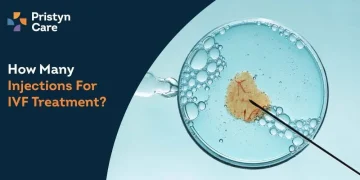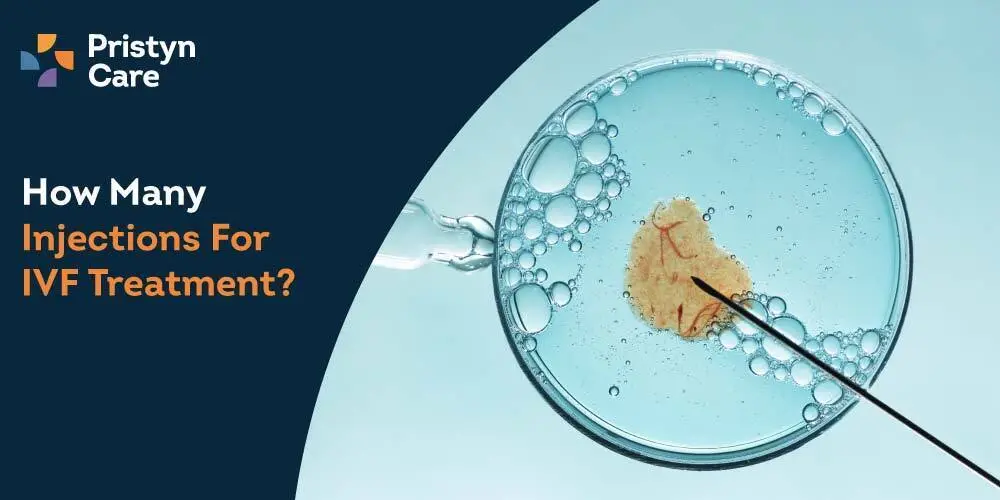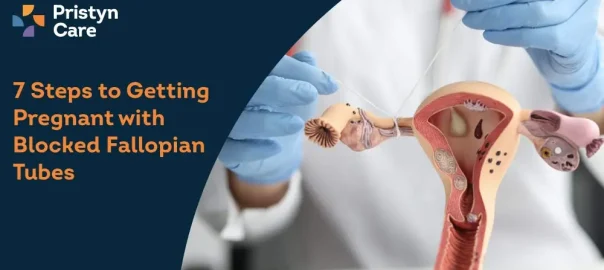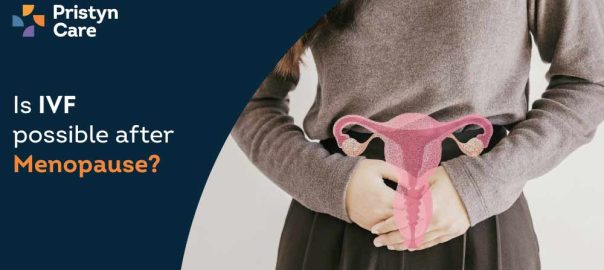![]() Views: 78
Views: 78
How Many Injections For IVF Treatment
Dedicated Support at Every Step!
Our Doctors are available 24 hours a day, 7 days a week to help you!
Call Us9513-316-643Table of Contents
Importance of Injections in the IVF Process
Secondly, these injections regulate and monitor your hormone levels. Hormones play a significant role in all stages of pregnancy. They help in egg development, implantation, and sustaining the pregnancy after the embryo gets implanted in the womb. Therefore, the injections ensure your hormone levels are conducive to a successful IVF cycle.
Lastly, some injections are used to trigger ovulation, the release of mature eggs from the ovaries. Timely ovulation is essential during an IVF cycle to synchronise egg retrieval with its optimal maturity.
No Cost EMI, Hassle-free Insurance Approval
How Injections Help in Achieving a Successful Pregnancy
Achieving a successful pregnancy involves many factors, including good-quality eggs and sperm, a healthy uterus, and hormonal balance. Injections used in IVF treatments play a significant role in ensuring these conditions are met.
For starters, fertility medications administered through injections improve egg production and quality. More eggs mean more opportunities for successful fertilisation in the laboratory.
Furthermore, these injections control the timing of ovulation. In an IVF cycle, eggs need to be retrieved before they naturally release from the follicles. Thus, having control over ovulation ensures that eggs can be collected at their peak maturity.
Lastly, progesterone injections help prepare your uterus for embryo implantation and support early pregnancy until the placenta develops fully. Progesterone is crucial for creating a supportive environment in your womb where the embryo can grow and develop.
The use of injections in the IVF process is not merely a medical protocol. It's a carefully planned strategy to increase your chances of achieving and maintaining a successful pregnancy.
Types of Injections Used in IVF
In vitro fertilisation (IVF) is a complex procedure that involves several distinct stages. One of these stages includes the use of injections. Let's break them down:
- Hormonal Injections: These are typically administered in the initial stage of the IVF cycle and are designed to stimulate the ovaries to produce multiple eggs for retrieval.
- Progesterone Injections: Progesterone, commonly referred to as the 'pregnancy hormone', is vital in preparing the lining of the uterus for implantation. Injections of this hormone are typically given after egg retrieval to increase the chances of a successful pregnancy.
- Other Injections: These could include drugs like Gonadotropin-Releasing Hormone (GnRH) Antagonists, which help control the release of mature eggs, and Human Menopausal Gonadotropin (hMG), which stimulates the ovaries to produce multiple eggs.
Understanding the IVF Injection Schedule
The IVF injection schedule is crucial for the success of the treatment. A typical schedule might look something like this:
- Ovarian Stimulation Phase: This is when hormonal injections are given daily for 8–14 days at the start of your menstrual cycle to stimulate the ovaries and encourage them to produce multiple eggs.
- Ovulation Triggering Phase: Once your eggs are mature, you'll be given another injection called "trigger shot". It helps in triggering ovulation within 36 hours, after which your eggs can be retrieved.
- Luteal Phase Support: After egg retrieval, you will be prescribed progesterone injections for about two weeks. These injections support the uterine lining and prepare it for the implantation of an embryo.
Remember, every individual's body responds differently to these medications and your doctor will adjust your dosage and schedule as per your body's response. Always follow your doctor's instructions to ensure the best possible outcome for your IVF cycle.
Factors Influencing the Number of Injections
The number of injections required during an IVF (In Vitro Fertilisation) treatment cycle can vary greatly. A few factors can influence this:
- Age: Younger women often require fewer injections than older women since their ovaries respond better to medicines.
- Hormone levels: The initial hormone levels in your body can determine the number of injections needed.
- Response to treatment: Some women respond better to fertility drugs and therefore may require fewer injections.
- Medical history: Previous health conditions, or surgeries, can also influence the response to treatment, thus possibly increasing the number of injections.
Each case is unique and your doctor will discuss with you in detail about your personalised treatment plan.
Common Concerns About IVF Injections
Many patients undergoing IVF treatment express common concerns regarding the injections. Here are a few:
- Pain and Discomfort: The thought of injecting oneself can be daunting. However, IVF injections are generally administered subcutaneously with fine needles which cause minimal discomfort.
- Side effects: Some may experience side effects like redness or bruising at the injection site. Severe reactions are rare but always consult your doctor if you experience any unusual symptoms.
- Fear of Incorrect Administration: It's natural to worry about administering the shot correctly. Don't worry, your doctor or nurse will demonstrate the correct method and provide guidelines for you to follow at home.
Understanding these factors and concerns can help you prepare for your IVF journey. Go ahead, discuss with your doctor and don't hesitate to share your worries or queries.
Tips for Managing IVF Injections
In-vitro fertilisation (IVF), a common type of assisted reproductive technology, often involves administration of certain injections. Here are some valuable tips to manage them:
- Stay Positive: IVF journey can be demanding and stressful, but maintaining a positive outlook is crucial. Remember, these injections are a step towards your dream of parenthood.
- Understand the Process: It is important to comprehend the purpose and procedure of each injection. This knowledge will help you understand why the injections are necessary and how they can help you.
- Seek Professional Assistance: A family doctor or a nurse can demonstrate how to administer injections properly. Practice under their guidance until you feel confident to do it on your own.
- Follow Cleanliness Practices: Always remember to disinfect the area where the injection is to be given.
- Ice Application: Applying ice to the injection site before administering can help numb the area slightly, making the process less uncomfortable.
- Rotating Injection Sites: To avoid irritation, it's advisable to rotate injection sites. Your doctor can guide you about suitable sites for rotation.
Remember that these measures are for your comfort and safety during this challenging yet rewarding journey. But there could be moments when you might need professional advice.
When to Seek Professional Advice
Even with all precautions in place, there could be situations that call for immediate medical attention. Do not hesitate to reach out to your doctor if you experience:
- Severe or Persistent Pain: Some discomfort at the injection site is normal, but if the pain is severe or continues for days, consult your doctor immediately.
- Fever or Illness: If you develop a fever or feel unwell after taking an injection, seek medical help right away.
- Allergic Reactions: Symptoms such as swelling, itchiness or redness around the injection site could indicate an allergic reaction which requires immediate attention.
- Emotional Distress: The IVF process can be emotionally challenging. If you're feeling overwhelmed, it's important to discuss this with your doctor or a mental health professional.
Remember, it's always better to be safe than sorry when it comes to your health and wellbeing during IVF treatment. Your team of healthcare professionals is there to guide and support you throughout this journey, so do not hesitate to reach out to them when required.
FAQs
- How many injections are required for IVF treatment?
The number of injections required for IVF (in vitro fertilisation) treatment can vary significantly, depending on the individual's response to medication and the specific protocol chosen by the doctor. On average, you may need to take one to three injections per day over a period of 8 to 12 days. - Is there a way to reduce the number of injections during IVF treatment?
The number of injections required is largely dependent on your body’s response and your doctor's protocol. However, certain strategies such as using longer-acting medications or employing different protocols may reduce the number of injections. It's always best to discuss this with your doctor. - Are all the injections for IVF treatment intramuscular?
No, not all IVF injections are intramuscular. Some are subcutaneous, meaning they are injected into the fatty layer just under the skin. Your doctor will guide you on how and where each injection should be administered. - Do all the injections for IVF treatment cause side effects?
While some people may experience side effects from these medications, not everyone will. Potential side effects can include temporary discomfort at the injection site, mood swings, headaches, bloating, and hot flashes. If you have any concerns, please consult with your doctor. - Can I administer IVF injections at home?
Yes, most people administer their IVF injections at home. You will be taught by a nurse or a doctor on how to correctly administer these injections. - How long does it take for the IVF injections to work?
The effect of these medications is not immediate and can take a few days to begin stimulating the ovaries. - Are IVF injections painful?
Everyone's pain threshold is different. While some may find the injections uncomfortable, others might find them minimal pain. Applying an ice pack to the injection site before administering the injection may help reduce any discomfort. - Can IVF injections affect my mood?
Yes, as these medications contain hormones, they can sometimes cause mood swings. If you feel overly emotional or anxious, talk to your doctor about it. - Can I take IVF injections if I have a fear of needles?
If you have a fear of needles, it's important to discuss this with your doctor. They can provide guidance and potentially suggest alternatives that may make the process easier for you. - Are there specific times in a day when I need to take these IVF injections?
Yes, most IVF medications need to be taken at the same time each day. This helps keep hormone levels steady throughout the treatment cycle. Your doctor will provide you with a specific schedule to follow.









